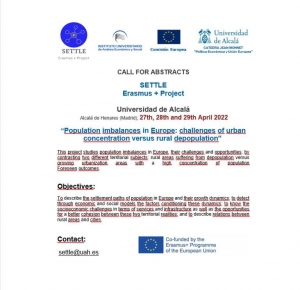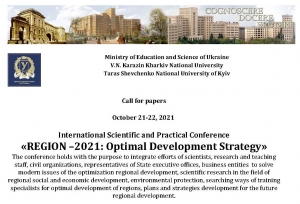Archives
Elisabete Martins
Dr. Manfred M. Fischer received the Bronze Medal of Masaryk University in Brno (Czech Republic)
Dr. Manfred M. Fischer received the Bronze Medal of Masaryk University in Brno (Czech Republic) for his contribution to establish the Regional Economics Ph.D. program and his contribution to the development of the Faculty of Economics and Administration of Masaryk University.
The ceremonial act of presenting the medal in front of the faculty academic community and members of the Scientific Board took place on 2021-10-11 as part of the celebration of the 30th anniversary of the Faculty.
Congratulations to Dr. Manfred M. Fischer on the outstanding achievement!
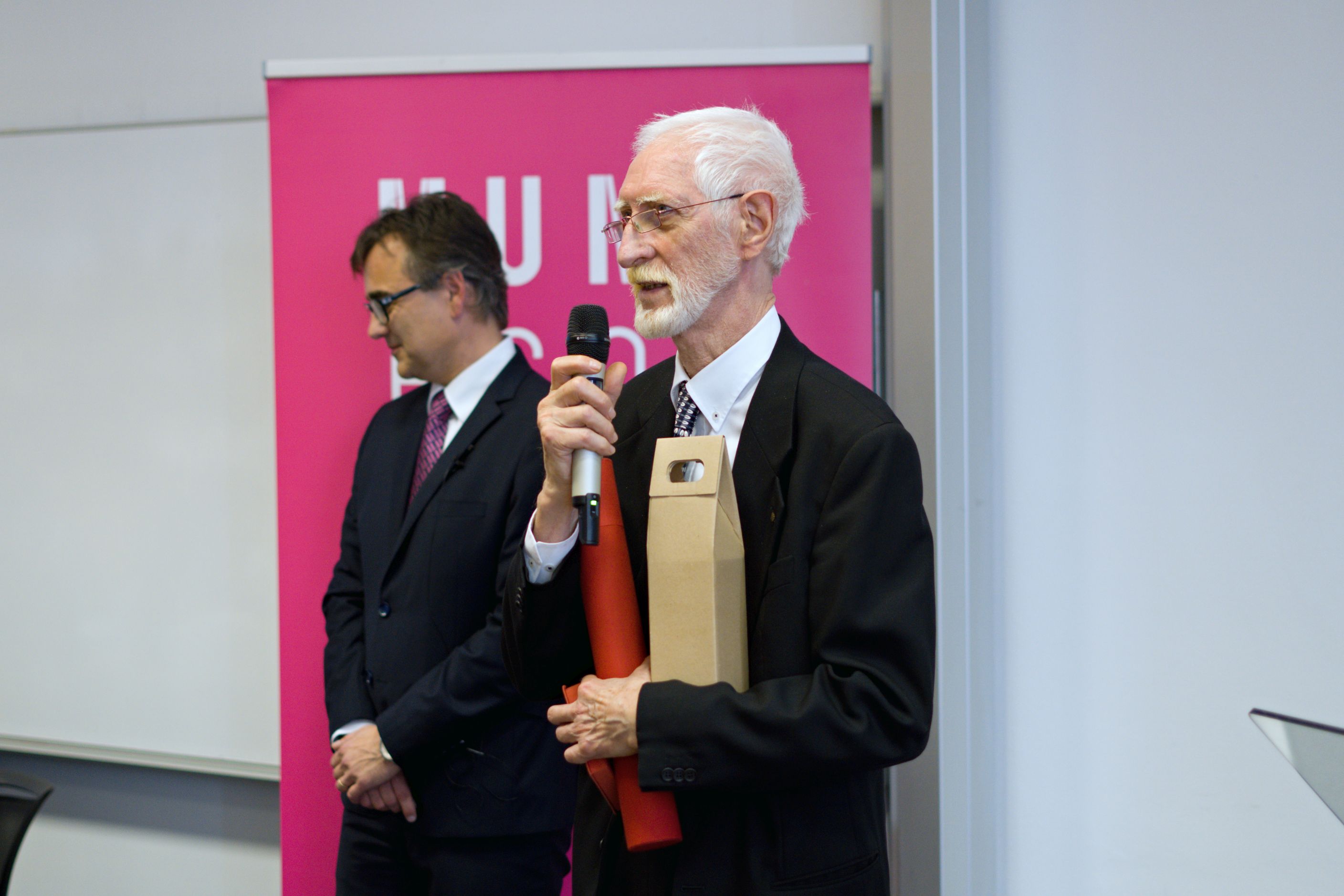
The latest issue of Papers in Regional Science is available! Volume 100, 5 (October 2021)
Papers in Regional Science
|
ISSUE INFORMATION
![]() Free Access
Free Access
Pages: 1111-1112 | First Published: 09 October 2021
FULL ARTICLES
Social capital, social economy and economic resilience of Italian provinces
Giuseppe Terzo
Pages: 1113-1135 | First Published: 20 May 2021
Unpacking the U‐shaped relationship between related variety and firm sales: Evidence from Japan
Ren Lu, Qing Song, Ting Xia, Daguo Lv, Torger Reve, Ze Jian
Pages: 1136-1157 | First Published: 22 April 2021
Quantifying fiscal multipliers in Italy: A Panel SVAR analysis using regional data
Matteo Deleidi, Davide Romaniello, Francesca Tosi
Pages: 1158-1177 | First Published: 07 June 2021
Welfare benefits in highly decentralized fiscal systems: Evidence on interregional mimicking
Luis Ayala, Ana Herrero, Jorge Martinez-Vazquez
Pages: 1178-1208 | First Published: 15 April 2021
![]() Open Access
Open Access
Modeling the spread of COVID‐19 in New York City
Jose Olmo, Marcos Sanso-Navarro
Pages: 1209-1229 | First Published: 11 May 2021
![]() Open Access
Open Access
Measuring the impact of ride‐hailing firms on urban congestion: The case of Uber in Europe
Xavier Fageda
Pages: 1230-1253 | First Published: 19 April 2021
Can the internet reshape the national city size distribution? Cross‐country evidence
Yu Wang, Bindong Sun, Sixu Wu, Wan Li, Tinglin Zhang
Pages: 1254-1272 | First Published: 03 June 2021
Xiaoxuan Sun, Diana Mok, Jinfei Wang
Pages: 1273-1294 | First Published: 08 June 2021
![]() Open Access
Open Access
Growth and inequality in the Mexican states: Regimes, thresholds, and traps
Juan Gabriel Brida, W. Adrian Risso, Edgar J. Sánchez Carrera, Verónica Segarra
Pages: 1295-1322 | First Published: 12 May 2021
RESEARCH NOTES & COMMENTS
![]() Open Access
Open Access
Standard modularity is unsuitable for functional regionalization of spatial interaction data
Lucas Martínez-Bernabéu, José Manuel Casado-Díaz
Pages: 1323-1330 | First Published: 14 May 2021
BOOK REVIEW
Michelle J. White
Pages: 1331-1333 | First Published: 07 June 2021
Research internship opportunity at the OECD Centre for Entrepreneurship, SMEs, Regions and Cities
Dear Colleagues,
I hope this message finds you well.
I would like to signal a research internship opportunity for graduate students at the OECD Centre for Entrepreneurship, SMEs, Regions and Cities.
We are looking to recruit several interns to work on a range of ongoing projects that require good analytical, analysis and writing skills. We offer a dynamic and stimulating environment and hands-on experience in policy analysis and empirical research in an intergovernmental organisation.
The internship can be virtual or in-person (depending on the sanitary situation and other circumstances); in the latter case, interns can be onboarded in Paris or in Trento, Italy. The start date is negotiable – we prefer selected candidates to join us in early 2022 but other timing can be agreed upon on a case-by-case basis. The duration of the internship is 3 to 6 months (the latter is preferred) with a possibility of extension up to 12 months. The OECD does not pay a salary but offers a contribution to living expenses slightly over EUR700 for each month of work.
More details and how to apply are here.
The deadline is 17 October 2021.
Please forward to anybody you feel would be a good candidate or to your networks to spread the word.
Thank you lots for your help.
With kind regards,
Alexandra
|
Alexandra Tsvetkova Centre for Entrepreneurship, SMEs, Regions and Cities |
Reminder - forthcoming deadline for submitting RSAI nurturing talent proposals
Dear RSAI members,
I hope this email finds you well.
This is just to remind you all of the forthcoming deadline (Oct. 10, 2021) for submitting proposals for receiving RSAI support for Nurturing Talent initiatives. You may find additional details and a list of the material to be submitted at the web site https://www.regionalscience.org/index.php/programs/nurturing-new-talent.html
Thank you very much in advance for your attention,
Kind regards,
The New Issue of Regional Statistics is already Available! (2021, VOL 11, No 4)
THE NEW ISSUE OF REGIONAL STATISTICS IS ALREADY AVAILABLE!
We are pleased to inform you that a new issue of the Regional Statistics has been released and now it’s avaiable online.
https://www.ksh.hu/terstat_eng_current_issue
REGIONAL STATISTICS, 2021, VOL 11, No 4.
STUDIES
Víctor Hugo Torres Preciado – Nelson Omar Muriel Torrero: Economic and crime cycles synchronization across states in México: A dynamic factor model approach
https://www.ksh.hu/statszemle_archive/regstat/2021/2021_04/rs110401.pdf
Dadang Ramdhan: Impact of provincial human capital on TFP growth through the FDI channel: The case of Indonesian manufacturing industries
https://www.ksh.hu/statszemle_archive/regstat/2021/2021_04/rs110402.pdf
Rudi Purwono – Mohammad Zeqi Yasin – Ibnu Nur Hamzah – Nur Arifin: Total factor productivity convergence of Indonesia’s provincial economies, 2011–2017
https://www.ksh.hu/statszemle_archive/regstat/2021/2021_04/rs110403.pdf
Han-Sol Lee – Sergey U. Chernikov – Szabolcs Nagy: Motivations and locational factors of FDI in CIS countries: Empirical evidence from South Korean FDI in Kazakhstan, Russia, and Uzbekistan
https://www.ksh.hu/statszemle_archive/regstat/2021/2021_04/rs110404.pdf
Emil Kucsera: The handling of the blockade against Qatar from the perspective of Qatar Airways’ resilience
https://www.ksh.hu/statszemle_archive/regstat/2021/2021_04/rs110405.pdf
Judit Berkes: Highly qualified social strata in urban areas of Hungarian regional centres from 1980 to 2011
https://www.ksh.hu/statszemle_archive/regstat/2021/2021_04/rs110406.pdf
Ferenc Szilágyi – Tibor Elekes: Urban growth and language shift in county seats in Transylvania between 1900 and 2011
https://www.ksh.hu/statszemle_archive/regstat/2021/2021_04/rs110407.pdf
Gábor Koloh: The number of Trianon refugees
https://www.ksh.hu/statszemle_archive/regstat/2021/2021_04/rs110408.pdf
Join us to our social networking sites:
ERSA Monthly E-news - September 2021
|
Job Position | Chief Executive Officer, DAKOTA INSTITUTE FOR BUSINESS AND ECONOMIC ANALYSIS
Job Announcement
Chief Executive Officer
DAKOTA INSTITUTE FOR BUSINESS AND ECONOMIC ANALYSIS
The Dakota Institute for Business and Economic Analysis, an applied business and economic analytical non-profit, seeks a full-time CEO to aggressively grow the Institute into a dynamic, self-sustaining, respected, and trusted source of economic and business intelligence, insight and analytics serving decision-makers in South Dakota, the Northern Great Plains Region, and the regional markets and economic sectors thereof.
The CEO reports to the Board of Directors. Office location(s) will be in South Dakota and the CEO will maintain a strong physical office presence. The position is available immediately.
Working with the Board, the founding CEO will help create and then lead a business and economic intelligence and analytical enterprise that earns an exceptional reputation because of timely and useful modeling and data derived insight on current and forecast economic and business conditions in South Dakota and the Northern Great Plains Region.
The successful candidate will be of high intellectual ability, have a strong first degree and a graduate or professional degree in economics, business, finance, law, decision science or related field. Experience and/or demonstrated accomplishments in economic/business analysis, modeling, insight, forecasting, data management, and team building are desired. The successful candidate will have a strong ethical value set, considerable personal confidence, and a collaborative style. Additionally, the successful candidate will be a decisive self-starter able to effectively operate in a role that relies on persuasive and earned authority rather than mandates.
Key competencies include entrepreneurial ability, communication and presentation skills, influencing skills, and organizational development/leadership skills. Quantitative economic/business modeling and data analytical abilities and an explicit understanding of econometric and economic impact software (i.e., R, Python, Stata, IMPLAN, REMI) are desired.
Compensation package will be competitive and may include performance-based incentives. Nominations are welcome.
Applications will be accepted, and screenings and interviews will be ongoing until the position is filled. For full consideration apply immediately.
To apply submit a letter of interest, a curriculum vita or resume, and the names and contact information for at least three but no more than five references to: Dakota Institute for Business and Economic Analysis, c/o Van Fishback, PO Box 5057, Brookings, SD 57006. For a prospectus on the Dakota Institute and for e-application see https://dakotainstitute.org .
Contact Van Fishback This email address is being protected from spambots. You need JavaScript enabled to view it. (605) 696-2230 to discuss this opportunity or make nominations.
Call for Papers | SETTLE International Congress: “Population imbalances in Europe”
SETTLE
Erasmus + Project
Universidad de Alcalá
Alcalá de Henares (Madrid), 27th, 28th and 29th April 2022
“Population imbalances in Europe: challenges of urban concentration versus rural depopulation"
Foreseen outcomes:
Objectives:
To describe the settlement paths of population in Europe and their growth dynamics; to detect through economic and social models the factors conditioning these dynamics; to know the socioeconomic challenges in terms of services and infrastructure as well as the opportunities for a better cohesion between these two territorial realities; and to describe relations between rural areas and cities.
Contact:
This email address is being protected from spambots. You need JavaScript enabled to view it.
Call for abstracts pdf
Call for Papers | Conference “Region-2021”, journal “Human Geography Journal” in Kharkiv (Ukraine)
The Department of Human Geography and Regional Studies, Faculty of Geology, Geography, Recreation and Tourism, V.N. Karazin Kharkiv National University (Ukraine) invites you and your colleagues to take part in the International Scientific and Practical Conference «Region-2021: Optimal Development Strategy» (October 21-22, 2021). The conference will be held in full-time, online and part-time forms. The call for papers see attached.
Deadline for submitting materials for the conference – October 10, 2021.
For more detailed information on the participation in the conference, please, contact via e-mail: This email address is being protected from spambots. You need JavaScript enabled to view it..
You can find out about main areas of the department work following the link: http://soc-econom-region.univer.kharkov.ua/index.php?lang=en
As well as we invite you to publish your papers in the scientific journal «JOURNAL OF HUMAN GEOGRAPHY» (professional journal, category “B”), included in the scientometric bases Index Copernicus, Ulrich's Periodicals Directory, Google Scholar, InfoBase Index, Eurasian Scientific Journal Index, Scientific Indexing Services, Cite Factor, Research Bible, OAJI, ERIH PLUS, DOAJ, processing in Scopus and Web of Science. Requirements to manuscripts see the following:
Manuscripts should be written in English.
Deadline for submitting papers to the journal – November 1, 2021. For more detailed information on the papers publication in the journal, please, contact via e-mail: This email address is being protected from spambots. You need JavaScript enabled to view it..
Call for candidatures - RSAI President elect
Dear Members of the Regional Science Association International,
according to the RSAI Constitution, each first year of term of the RSAI President, the Association faces the pleasant task of electing the Incoming President, who will in 2022 take on the position of President Elect, and work along with Prof. Eduardo Haddad, current RSAI President, to gradually move on to the position of President in 2023. Here is an excerpt of the rules of the Association for managing this important step:
Nomination committee. The RSAI Council has appointed a dedicated nomination committee, that following the rule of the RSAI Constitution is made up of the RSAI President (Eduardo Haddad), the RSAI Immediate Past-President (Mark Partridge), four members of the RSAI Council (one each from among the council members who are appointees of the four superregional organizations: Liz Mack for NARSC, André Torre for ERSA, Brian Kim for PRSCO, and Carlos Azzoni for LARSA), and two members of the Long Range Planning Committee (LRPC) recommended by the LRPC itself (Roberta Capello and Andrés Rodrigues-Pose).
Criteria of the nominees. The nominees should satisfy the following criteria: a) financial resources sufficient to cover travel costs to perform RSAI duties; b) support from candidate’s institution including relaxation of duties to enable President to travel as needed to execute RSAI business; c) RSAI Council experience (Council member experience) and/or other service to the regional science community (e.g., supra-regional and/or other sections, editor or one of the regional science journals, etc.).
Election procedure. The President Elect nomination committee shall [...] make a recommendation to Council at the second Council meeting of this same year . Upon receiving this recommendation, Council will select a nominee. The President‐Elect and Vice‐President shall start his/her appointment at the start of the next calendar year (i.e. the second year of the current President’s term).
RSAI members from the ERSA area who want to be nominated as candidate for the President of the Regional Science Association International should send to This email address is being protected from spambots. You need JavaScript enabled to view it. within Oct. 20, 2021 the following material:
- A two-page CV and a Picture;
- A two-page statement on the motives in support of the candidacy and on the future strategy for the RSAI.
The Nomination Committee will then nominate the candidates to be voted on-line by the Members of the Council. Results will be diffused through in RSAI webpage.
Thank you in advance for participating in this crucial stage of the Association's life,
Kind regards,
About Us
The Regional Science Association International (RSAI), founded in 1954, is an international community of scholars interested in the regional impacts of national or global processes of economic and social change.

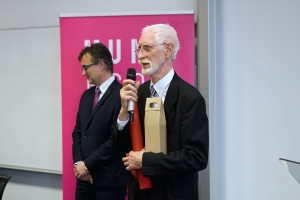
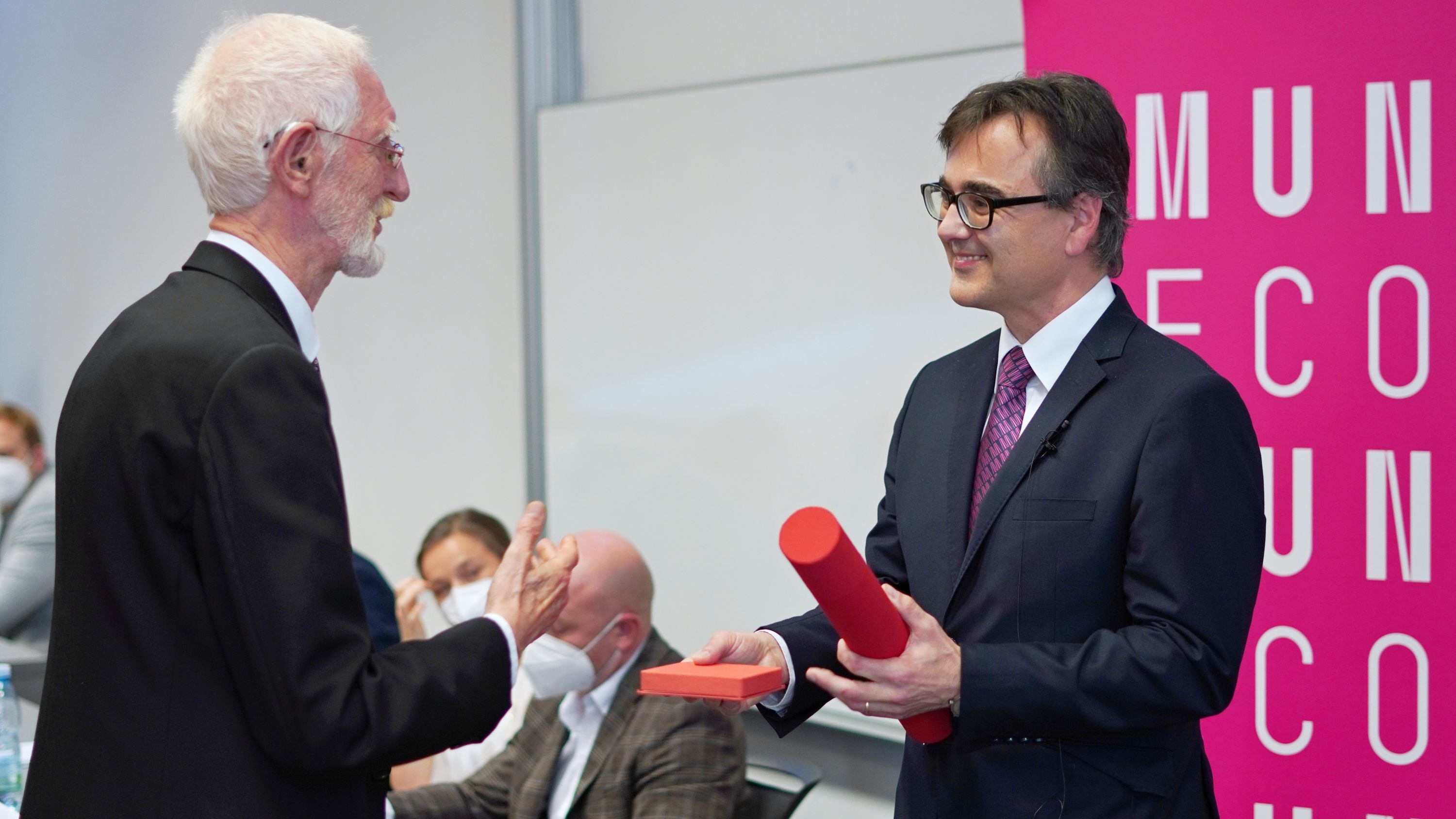
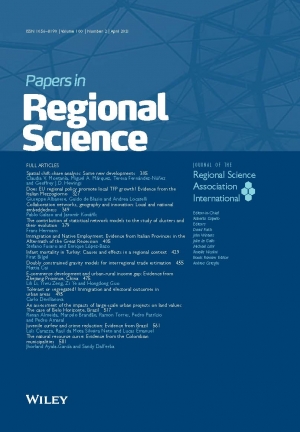


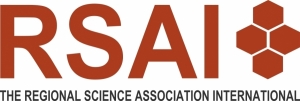

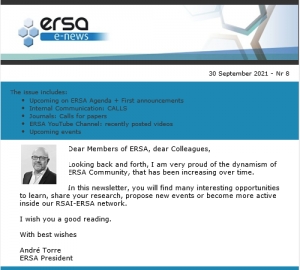

 Dear Members of ERSA, dear Colleagues,
Dear Members of ERSA, dear Colleagues,
 #EURegionsWeekUniversity Sessions HIGHLIGHT
#EURegionsWeekUniversity Sessions HIGHLIGHT 
 4th ERSA Winter School
4th ERSA Winter School
 For the first time, ERSA 2022 Annual Congress will be delivered in a hybrid event format, combining in-person and virtual participation.
For the first time, ERSA 2022 Annual Congress will be delivered in a hybrid event format, combining in-person and virtual participation.





 #ERSA2021 Keynote lectures are now available
#ERSA2021 Keynote lectures are now available









